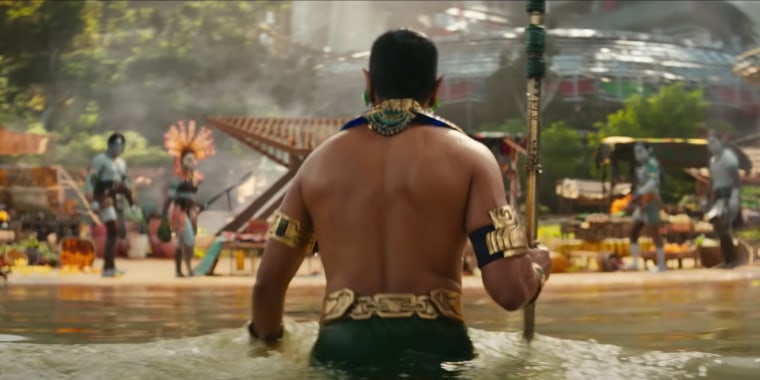Last weekend’s trailer release of “Black Panther: Wakanda Forever,” the much-anticipated sequel of “Black Panther,” was watched millions of times, and, as expected, fans expressed love for actor Angela Bassett, director Ryan Coogler and the late Chadwick Boseman, who starred as King T’Challa, the Black Panther, in the first film. But the excitement has also led to expressions of love for Tenoch Huerta and Mabel Cadena, who will play Namor and Namora in the new film. Huerta and Cadena were born in Mexico (as was Oscar winner Lupita Nyong'o who returns as Nakia), and the trailer made it clear to anyone paying attention that the “Black Panther” franchise has gone all-in on inclusivity.
The trailer made it clear that the “Black Panther” franchise has gone all-in on inclusivity.
Credit those responsible for making “Black Panther” a global phenomenon for understanding that if one wants to create a movie franchise that will endure for generations, giving new space to Latino and Latina characters is a genius move. That move illustrates how allyship between two historically marginalized groups in Hollywood, Black people and Latinos, can take the industry to new heights.
At the San Diego Comic Con where the trailer debuted, Huerta told an audience, "I'm excited and I'm so happy to be here, it's an honor. And I want to say something really fast about inclusion. I come from the hood, seriously. And thanks to inclusion, I'm here. I wouldn't be here without inclusion. A lot of kids out there in their hoods are looking at us, dreaming to be here, and they're gonna make it! They're gonna make it."
He then thanked “all the Latin Americans,” especially those who left their home countries, to find hope in the United States. It was a moment of pure joy that resonated with many, including one actor who tweeted, “As a Mexican-American actor with darker skin and a child of indigenous parents, I’ve felt firsthand the colorism inflicted on Latin Americans in entertainment. As such, I can’t describe the joy of recognizing the gorgeous, talented @TenochHuerta in the #WakandaForever trailer.” Indeed, the release of the trailer also served as a moment of pure joy for the possibilities of what characters with Mesoamerican origins would mean to audiences.
For that, those behind the “Blank Panther” franchise should be considered not just revolutionary but also smart and savvy for their awareness that being inclusive also makes for great business. For years, Latinos have been identified as the nation’s largest group of moviegoers, but such box-office buying power has resulted in no real increase in more roles and representation. The addition of Huerta and Cadena to the “Wakanda Forever” cast confirms that the “Black Panther” franchise is leading the way in cementing a new Hollywood that is less white.
Before and after “Black Panther” hit screens in 2018, some prominent Latina and Latino actors missed the opportunity to celebrate what Hollywood could become if they rallied around the efforts to transform the film industry. Instead, they questioned the absence of Latinos.
“Marvel and DC are killing it in inclusion and women, but where are the Latinos?!, Asking for a friend …” actor Gina Rodriguez tweeted back in 2017 during the promotional campaign for “Black Panther,” sparking a backlash that she may still be feeling today. In 2020, actor John Leguizamo, who has made other problematic comments about Latinos and Black people in Hollywood, dreamed about a “Latin superhero movie like Black Panther was for African Americans.”
Latino representation is still lacking in the entertainment industry, but that's not the fault of Black filmakers and directors.
There is no question that Latino representation is still lacking in the entertainment industry, but that's not the fault of Black filmmakers and directors. Hollywood, the overwhelming majority of which is white, does a good enough job by itself not taking Latinos seriously, and as long as we keep getting remakes of tired stereotypes or rereleases of movies from the 1990s, there will be little progress.
Comments such as those made by Rodriguez and Leguizamo have the effect of reducing the accomplishments of Black people telling Black stories to audiences all over the world. Those comments also ignore the fact that close to 6 million U.S. adults identify as Afro-Latino or that 5 percent of the U.S. Black population identifies as Afro-Latino. These Afro-Latinos understand what Leguizamo does not, that a Black superhero film doesn’t necessarily leave Latino moviegoers feeling left out.
Here’s to more examples of inclusion and intersectionality, whether it’s in “Black Panther: Wakanda Forever ” or in “Judas and the Black Messiah,” which featured Puerto Rican Young Lords. Despite the issues of race that some Latinos still don't fully comprehend, allyship in Hollywood needs to be commended and elevated.
Anyone who cares deeply about representation and its power to change narratives needs to support franchises like “Black Panther,” especially when the people behind that franchise know the franchise can lead the way in pushing for actual change. So, Wakanda forever. Because while no work of art is perfect and there will always be detractors, once inclusivity becomes the next wave of box-office success, Hollywood will never look back.

